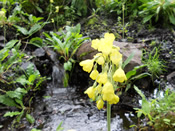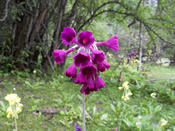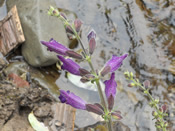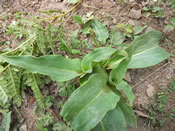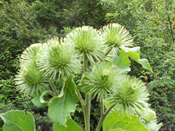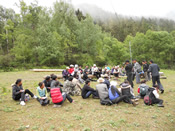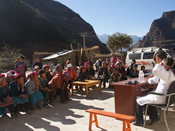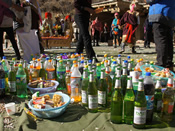
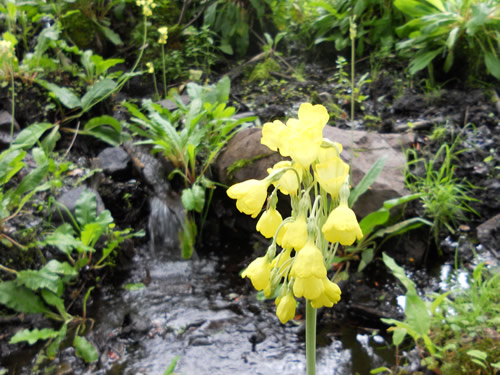 |
| Yellow primrose is used by the Zang people for clearing lung-heat and reducing inflammation. (Shen Dingfang) |
By Sinan Nima (of the Zang ethnic people, the core village participant in PCD’s programmes in Fo Shan, Deqin County, Yunnan Province)
I was born in an impoverished mountainous area. Because my family was poor, I left school after primary three. When I was 11, I had the opportunity to study traditional cultural customs and the Tibetan language with an elderly lay Buddhist. I later studied Tibetan traditional medicine with my teacher, Deqing Jimei, from the Tibetan Hospital of Diqing Prefecture for a period of time. In the early 2000s, the village hospital was recruiting village nursing assistants. Since I had already learned some Tibetan medicine, I was recommended by the village's leadership group for such training. I became a village nursing assistant after completing my training in the village hospital.
Later on, I came to know teacher Mu Suo from the Kawagebo Cultural Society. He taught me how to organise cultural preservation activities and how to start a Tibetan language evening school. He also taught me traditional Tibetan songs and dances. Through these activities, I met PCD, which supported such village programmes for the Zang people.
Western and Chinese patent medicine abuse
With the support of PCD, I conducted a study of mutual help in my home village. This study found that the happiness that these villagers of an impoverished mountainous area had long enjoyed was rooted in their willingness to look out for each other. My poor family would be in turmoil if we were living in the city or elsewhere. It is the living traditional culture and the spirit of mutual help in these Tibetan mountains that have sustained my family here. The study also found that because of the village's remoteness, there was a period when it lacked medical facilities, medicines, and quick medical attention. However, when nursing assistants arrived in the village, and because of the availability of village health insurance, both Western medicine and Chinese patent medicine became very affordable. As a result, the villagers started to abuse these drugs. Some villagers would ask the village nursing assistants to give them injections simply because they were feeling that they were about to catch a cold or suffering only slight physical discomfort. A few nursing assistants complied by giving them antibiotics, just to make some money. Antibiotic abuse was so serious then that eighty percent of the villagers received these injections annually. Some villagers were addicted to the Western painkillers and needed to take several pills each day. But the higher the dosage, the more they needed for the medicine to take effect.
Lavish consumption of outsourced food leads to garbage piling up
Apart from substance abuse, villagers were also at one point very dependent on outsourced food. They would consume large quantities of package drinks, beer, and junk food, especially during special occasions such as weddings and funerals, and also during New Year and other festivals. They even took these foods to the mountains when collecting caterpillar fungus and matsutake mushrooms, then let the garbage pollute the community and the natural environment, and affect the villagers' health.
Later, I asked PCD to support the village nursing assistants and village doctors here in carrying out a survey on community health. The survey mainly looked at the drug use situation, medical dependency, income and expenditure patterns of the villagers and alcohol consumption at their wedding ceremonies. The project also supported short term traditional Tibetan medicine training for the village nursing assistants, so as to improve the community health of the village. Almost all the nursing assistants came – a total of 18 attendants. After a few years of ongoing data collection, exchanges and training sessions, some of these nursing assistants demonstrated major improvements. Many of them significantly cut antibiotics use, and even organised activities to promote ecological health for the villagers. One such person was Sina Zhashi, the village nursing assistant of Ba Mei Village. He mobilised his home village to handle garbage properly, including at places where they pick caterpillar fungus and matsutake mushrooms. The villagers also voluntarily took more traditional food, reduced the consumption of outsourced food, and started to protect wild animals. Cili Quzong, another Ba Mei Village nursing assistant, organised women in the community to collect and sort the garbage for recycling and disposal. Villagers also exchanged views on the harm that outsourced food could do to their health and to the environment. A nursing assistant from Gu Shui Village said she now rarely gives villagers injections, and gets quite a few complaints from them as a consequence. In response, she explains to the villagers that it isn't that she is unwilling, but indiscriminate use of antibiotic shots is detrimental to their health.
With the short term training given out by my teacher Deqing Jimei and the Tibetan doctors from Fo Shan township, the village nursing assistants are now equipped with some Tibetan medical lore and also knowledge about how to treat some common diseases. They no longer just give people vaccinations for their colds, but will treat the patients with Tibetan medicinal teas and other traditional cures. As for the villagers, for some of them after quitting their addiction to painkillers their headaches were gone forever after a month or so.
Excessive beer consumption
We also had a concern over the excessive consumption of beer in the village. A village group under the Ba Mei Village Committee used to drink beer excessively at weddings. It was appalling to see them tossing and drinking back bowls that could hold two catties of beer. Too often, guests from both the bride and the groom's side fell sick after attending a wedding. Villagers felt bad about it, but since it had become a custom or tradition, it was difficult to shake off. Our village nursing assistants went through the income and expenditure statements of weddings and discovered that one of the weddings received RMB25,000 in wedding gifts, but spent almost RMB20,000. One-third of the expenditure went to drinks and beer. We showed these figures to the village head, and he gathered the whole village to talk about it. It was agreed that a guru was to be invited to help the men quit drinking and also that rules were to be laid to ensure that villagers would not be drinking as excessively as before.


